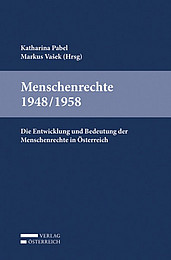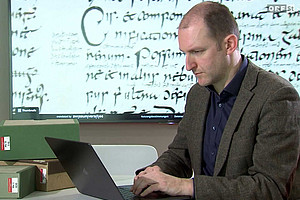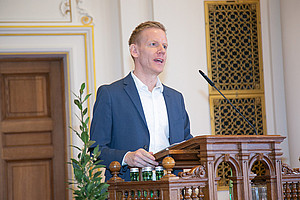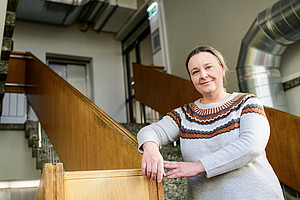Moussa is on a ship from Somalia destined for Europe, and it sinks. Hannes and Gerlinde, who are cruising through the Mediterranean in their luxurious catamaran, rescue the young man, who asks them to bring him to shore illegally. Should the couple help Moussa and be potentially accused of human smuggling?
This is the question addressed in the short film BOATPEOPLE by the young Austrian director Paul Meschuh. This is just one of the 19 films that Silvia Schultermandl und David Hucek, cultural studies researchers at the Institute of American Studies at the University of Graz, analysed within the scope of the Erasmus+ project ‘Hospitality in Film’. One of their aims is to make an online film registry ‘to enable a more sensitive, reflected debate on the so-called refugee crisis in times of increasing populism and, at the same time, to highlight Europeans’ role in migration, flight and asylum within a global context’, explain Schultermandl and Hucek.
The researchers chose 19 films from nine European countries for the analysis. Schultermandl and Hucek found it particularly interesting that all of the films were from the perspective of the ‘recipient countries’ and illustrated their approaches to hospitality. The researchers drew the following conclusion: ‘We saw that European filmmakers consciously address a variety of ‘domestic’ topics, so to speak, which are often ignored in public debate surrounding refugees’, says David Hucek. One example is the issue of gender equality. Do liberality, open-mindedness and tolerance of diversity – values which have been considered fundamentally European since the Enlightenment – really apply for everyone? Certainly not, stress the researchers. ‘The message to refugees is something more like, ‘We’re opening our borders, and here are the rules we expect you to follow’’, explains Silvia Schultermandl. Power structures in relation to refugees are established quickly and clearly to avoid becoming a prisoner in your own home. This set of rules isn’t applied so strictly to other Europeans, at least not an interpersonal level. The European film addresses this ‘new form of xenophobia’, which is how the researchers refer to this discrepancy, as much as the topic of Europe’s international accountability in terms of the 2015 refugee crisis.
However, the concept of hospitality goes beyond the topics of migration, flight and asylum. In Christoph Kuschnig’s short film ‘Hatch’, for example, there is a same-sex couple that takes a newborn out of a baby hatch but, owing to societal pressure, ultimately puts the child back because of perceived failure as parents. ‘This shows that your own country can be inhospitable towards you if you don’t follow a certain pattern’, say Schultermandl and Hucek.
The two Austrian researchers are part of a project consortium with seven partner universities in Spain, Great Britain, Ireland and Sweden. In addition to the online film database, a Mooc (Massive Open Online Course) on ‘Hospitality in Film’ is being planned for students; it will be completed during the course of the year. A documentary on musicians with immigrant backgrounds in London and Amsterdam is set to be made by the end of next year.
More information: https://hostfilm.usal.es
>> Film: The Sounds of Hospitality
Contribution of Univ.-Prof. Gerd Oberleitner in "Menschenrechte 1948/1958"

Katharina Pabel / Markus Vasek (eds.)
(Wien: Verlag Österreich, 2020)
"Menschenrechte 1948/1958 - Die Entwicklung und Bedeutung der Menschenrechte in Österreich", with a contribution by UNESCO Chair Prof. Gerd Oberleitner on 40 Years International Covenant on Civil and Political Rights in Austria. The publication highlights the impact of international human rights treaties on the Austrian legal order since 1948.
For more information please visit the homepage of Verlag Österreich!




